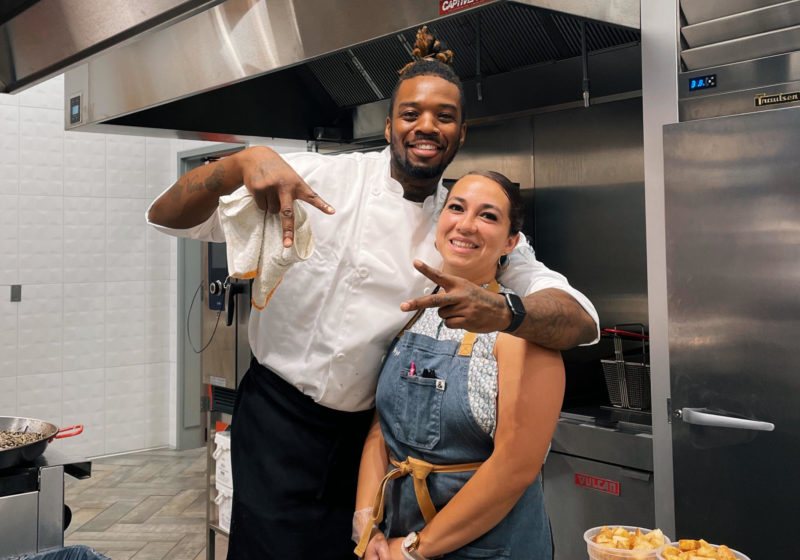In the heart of downtown Rochester sits the only community kitchen in Monroe County. Launched in October 2020 in the Sibley Building, The Commissary is Rochester’s first food business incubator.
Last week, I visited the site and talked with Laura Fox O’Sullivan, the President of The Commissary, to learn more about this exciting enterprise. She is also the Vice President of the non-profit Rochester Downtown Development Corporation (RDDC) and has been a leading member of The Commissary since the beginning.
The project was first conceived in 2016 by a group of economic development and urban planning experts that visited Rochester who recommended it to RDDC. O’Sullivan and Heidi Zimmer-Meyer, the President of RDDC, loved the idea.
“We thought there was a need and a demand for it,” O’Sullivan said. “As part of our mission at RDDC, we felt that this was on mission because it was about creating economic opportunities for all different types of people and it was about enlivening downtown.”
From there, RDDC first needed approval from Monroe County to open a shared kitchen, something that is normally illegal. Thankfully for them, the County granted them approval after they provided proof that food safety would be a top priority. Once they received the go-ahead on the project, the small team at RDDC needed to begin the monstrous task of fundraising about two million dollars. Their biggest donor was the U.S. Economic Development Administration, which gave them a nearly one million dollar grant. The rest of the money came from a wide variety of donors including organizations such as the Rochester City School District, Wegmans, and NYS Empire State Development. Donations over $500 are featured on a fun flame-themed wall in the performance kitchen. “This really has been a community project,” O’Sullivan noted.
Construction officially began in December 2019 but slowed down due to COVID-19. Luckily for them, construction was eventually completed and The Commissary officially launched less than a year later in October 2020. “We were very quiet October through March, and then [in] April/May, we started to get much busier,” O’Sullivan said. “I think people were starting to feel more confident in the ability to launch their business. I hope that confidence continues.”
There are three main sections of The Commissary: the performance kitchen, the prep kitchen, and storage. The performance kitchen can be used to host private meals, events, and tastings. Some people even film video workshops and tutorials. The prep kitchen has tables and equipment that are rented by the hour through a scheduling system. The storage cages allow members to safely keep their ingredients on-site and are also available for rent. This system helps lower the cost of entry to the food industry by eliminating the need for members to own a professional kitchen and storefront or food truck. O’Sullivan emphasized that “We’re all about a flexible and affordable approach to launching your food business.”
The Commissary currently has 43 members. 57% of the businesses are BIPOC-owned and 52% are women-owned. The businesses vary from baked goods, sauces, teas, BBQ, soups, tacos, and more.
Three of these 43 are regulars: Biscotti Brewers (a gluten free bakery), Que Chèvere (Puerto Rican food), and Le Petit Poutine (poutine, obviously). Lisa Malavez, owner and chef of Que Chèvere, uses the take-out window at The Commissary to serve lunch Tuesday through Friday. Kayla Sandoval, owner and baker of Biscotti Brewers, sells her products at lots of markets around town and is hosting her first event in the presentation kitchen this coming Friday. Le Petit Poutine is possibly Rochester’s busiest food truck, and is in The Commissary kitchen almost every day until they finish building their own brick-and-mortar location. You can keep up with the members and any events through their Instagram @roccommissary.
O’Sullivan hopes that with the help of The Commissary’s incubation services, businesses will start to be on-site more regularly as they grow. She told me, “What we’re here for is to provide them with a space that is affordable, that’s flexible so that they can launch their businesses, do a lot of market testing, learn lessons, and then with all that knowledge go out and make a decision on what their next step is and then help them along the way with that.”
Besides providing their members with a professional kitchen, The Commissary also hosts workshops to help members with their business strategies and has an “entrepreneur-in-residence” program that connects members with a local entrepreneur in the food industry who can help them scale up their business.
When asked about her goals for the Commissary in 2022, O’Sullivan stated, “I would like for us to continue to get the word out about what the commissary is because there are so many aspiring food entrepreneurs [in Rochester]. My goal is to help people who want to have a food business legitimize their business, professionalize what they do, and also see that there is so much opportunity for that.”
In terms of growth for Rochester, she remarked, “We’ve made a lot of progress. COVID[-19] has definitely been a blow for downtown, but I do think there are a lot of people moving back from other cities who thought they may never come back. With that comes expectations for certain things, for really good food, and things to do, and I think that helps raise the bar for what we want for our community.”
And as for how The Commissary plays into this, “We like to think that with this [The Commissary], we are playing a small role in revitalizing downtown.”





